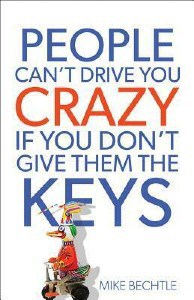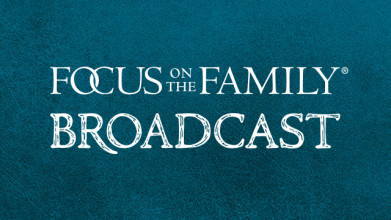Dr. Mike Bechtle: We’re not here to change people. This is family. We’re here to love people. And sometimes the hard stuff gets in the way of that. So to have that perspective, I’m here today to have the attitude that I’m going to love these people. Whatever that looks like and even-
Jim Daly: That’s a great starting point.
Mike: … intentionally…
Jim: Yeah.
Mike: … think, for each person, what could I say today that would encourage them?
John Fuller: That’s Dr. Mike Bechtle, and he joins us today on Focus on the Family. Your host is Focus president and author, Jim Daly. And I’m John Fuller.
Jim: You know, John, this time of year is so full of family gatherings, which is great, but it also can bring some stress. Um, I’m not going to say, do you have certain stre- stress but…
John: (laughs)
Jim: (laughs)
John: Yeah, some stress, uh, associated with this season. Yes.
Jim: You don’t want to name names.
John: No.
Jim: But the point is, you know, these are the extended family coming over or you’re going over to some family member’s house for the holidays and-
John: You got to remember the rules.
Jim: Gosh.
John: You got to remember everybody’s preferences.
Jim: Yeah. And then when there’s no rules, that’s a problem.
John: Uh-huh.
Jim: Because then you’re stepping on feet, you don’t know. And so today we want to equip you. And believe it or not, we get a lot of questions from the listeners about these kinds of experiences…
John: Mm-hmm.
Jim: … where the in-laws are overstepping and, you know, they’re over parenting, “We’re the parents, not our parents.” All that, right? So we’ll get into some of that today with our special guest, Dr. Mike Bechtle who is here to offer that practical advice.
John: Yeah, and you mentioned we hear a lot from listeners about this. This is a proactive, uh, program for you. This is in response to listener insights and, uh, questions. Dr. Mike Bechtle is a good friend who’s joined us a number of times here in the studio, and he’s an author, speaker, and blogger who specializes in communication and leadership training. Uh, he’s written a book that serves as the basis for our conversation. People Can’t Drive You Crazy If You Don’t Give Them the Keys. It’s a great title, and we’ll invite you to check it out. Uh, we have details at focusonthefamily.com/broadcast.
Jim: Mike, welcome back to Focus.
Mike: Well, thanks. It’s always such a privilege.
Jim: It’s good to have you here, especially this time of year, so we can talk about these touchy situations with extended family members. Now, let’s just say it straight. I mean, some people within the family are better at pushing buttons and stirring up drama than others. Uh, I guess the question is why do we get so riled up about those that rile us up?
Mike: Well, I think we all know how to push buttons. I remember when I was a kid going to museums I didn’t care what I saw, but if it had a button that would make something happen. And so I would just go around pushing buttons, but I think there’s people that do that and it’s part of their temperament. If I know that I can bug you a little bit, then I pick up on it, and I continue to do it.
Jim: Okay, but, uh, we are Christians…
Mike: Mm-hmm.
Jim: … for the most part. If you’re not a believer, here’s some insight to the church, but we’re supposed to not push buttons, or learn how to not push buttons, but to love people.
Mike: Well, I’m also human. And the, you put those…
Jim: (laughs)
Mike: … two together, sometimes I do the things that I don’t want to do, but, or maybe I do wanna do.
Jim: So what factors are coming into play with, you know, Thanksgiving, Christmas, New Year’s, the holiday season? What are the factors that come into play that make this such a rich target? (laughs)
Mike: You know, I think one of the biggest factors is expectations. Because maybe we just have this picture in our mind that Christmas is supposed to be like Amy Grant says, “It’s the most wonderful time of the year.”
Jim: Mm-hmm.
Mike: And we want it to be that way. And we want people to come over and everybody gets along. And Thanksgiving, we come together for a celebration. And maybe we don’t feel so thankful about some of the people that are coming, but they’re extended family. We have to invite them or we feel like we need to. And we kind of dread it because we know that they’re going to be that little burr in the saddle, that, the piece of sand in your shoe that just makes things kind of hard.
Jim: Now you, you and Diane mentor couples. Uh, wh- what do you hear with the seasons of marriage? What kind of comments are younger couple, mid-age couple, older couples? What do they say that has caught your attention?
Mike: Well, usually I think when they’re young, and especially when they first gotten married, we know that they’re in love. They don’t know everything that’s going on. And then all of a sudden, the first thing that comes up is parents.
Jim: (laughs)
Mike: Because you have two sets of parents with different expectations. And it shows up at the holidays because it’s like, “Well, but you’ve always come to our house.”
Jim: (laughs)
Mike: “And so, of course, you’re going to do it this year.” And the other parents are thinking the same thing. So how do we negotiate that? And then if you put a child in the, in the mix, and they have the first baby, now it’s make it, made it even more volatile. Because, “Well, this is my grandchild, you’re going to raise him or her the way we raised you, right?” And the other parents are thinking the same thing, but then you have your own ideas. And somehow the holidays bring that out. And-
Jim: Well, in that context with the younger couple, what do you say to them when they’re going, “Yeah, our parents both want us to be there on the same day at the same time”?
Mike: Well, then we talk about wh- what they have actually said. What are the words they use? And then we negoti- we talk about how do you negotiate that? It’s like, “We love you. We want to be at your house, but we also have our own family now. We’re trying to build that.” And so, um, that’s where the dynamics is bringing the elephant into the room and putting it on the table.
Jim: Do you think, and we’ll get on with the other couples at an older stage there, but sticking with the younger couple that’s encountering this dilemma with in-laws. One of the solutions I often hear, and Jean and I didn’t have to do this because my parents were gone. So we only had to go to her mom and dad’s and that was a good thing. The point of that is, uh, one solution is to alternate year by year. So one year you go with one set of parents, the next year… Is that typically the solution that works?
Mike: It’s a pretty good one. Usually the, both sets of parents are grumpy at first because it’s like, “No, I don’t want to be the off year.”
Jim: Hey, we got to give a little here. (laughs)
Mike: And, and you, and you do, and it’s hard, but those are those tough conversations.
Jim: Yeah.
Mike: That’s what we ended up doing. We had them in different states, and so we couldn’t be in proximity, but we would do the pa- we would still go see the other family, but not on Christmas Day, or not on the holiday, not on Thanksgiving.
Jim: Yeah, so when you’re looking at, again, the, uh, the years of being married and the things you encounter, so that’s the young couple that’s figuring it out. Now, talk to to the parents of those young (laughs) couples.
Mike: Mm-hmm.
Jim: What are they griping about?
Mike: The fact that they don’t get their way as much. Because we have certain ways that we expect our kids to perform. I mean, we raise these kids. And if they do anything different than how we raise them, it’s like, it feels like a slap in the face.
Jim: Mm-hmm.
Mike: Because it’s like, “Well, wasn’t it good enough what we did with you? Why are you trying to do it differently?” And it’s a, it’s a personal thing. So we talk to those parents about re-evaluating how their perspective is. It’s like, “Okay, there have been changes.” And, and it’s to be able to do that in a way that, uh, affirms them, shows there’s a respect in the family, that, “Your kids still care about you, but we need to find new wineskins.”
Jim: Mm-hmm.
Mike: New ways of making this work.
Jim: Now the people that seem to really get this is grandma and grandpa. Somehow years mellow them out typically, not always.
Mike: Mm-hmm.
Jim: So what do you hear from older couples that have adult children that are now, you know, parenting adult children. (laughs)
Mike: Yeah, well, they’ve, they probably went through all those challenges with their kids. And so they have negotiated it and they’ve survived. They’ve come through it…
Jim: Mm-hmm.
Mike: … but now they’re just wiser. They know what worked, what didn’t. You learn to pick your battles at that age as well. And we’re at that stage because we have our grandkids, we have our kids and we have told them, and it’s worked really well. We had to give it up, give up our expectations and say, “You know, you have your own family. And so, this needs to be for you. We want to see you at Christmastime. We’re not demanding that everybody spends the night on Christmas Eve in their jammies, and then the next morning we’re all together with fruitcake.” It’s the, it’s a matter of accepting the fact that these things have changed. And when you get to that stage, we’re not, we’ve realized they’re not going to do it our way all the time.
Jim: You have five characteristics of family drama. So let’s unveil those five characteristics.
Mike: Okay, one of them is emotion that when there’s family drama, it, you feel something. The second one is people. That we, the drama comes from other people, usually. It’s sometimes-
Jim: Of course, always other people.
Mike: Well, even if it’s-
Jim: (laughs)
John: (laughs)
Mike: … even if it’s an event, if it’s something that happened, someone was involved in making that happen.
John: Mm-hmm.
Jim: Right.
Mike: And so, so that tends to bug us, the unmet expectations. Third is unexpectedness. It’s almost always something we didn’t expect. And so, we’re doing okay for a while, but then when the doctor uses the word terminal, or when the police call at midnight about your teenager. You weren’t expecting that, either of those. And it changes, it brings a new level of drama into your life.
Jim: Let me describe one of those, like when somebody brings the green beans with onions or whatever, and someone goes, “Does anybody ever eat those?”
Mike: (laughs)
Jim: It usually doesn’t go down well with the person who brought it.
John: (laughs)
Mike: Well, I’m going to scoop a little on the trash and put it back, and it looks like it’s in been-
Jim: See, that’s wisdom. That’s grandparenting wisdom right there.
Mike: (laughs)
Jim: Anyway, go ahead.
Mike: Uh, the, the fourth one is, uh, personal impact. Crazy things happen in our world, but not all of them impact us. If the head of a corporation is embezzling funds, we don’t think too much about it unless it’s, uh, the corporation we’re in and it’s our retirement funds. Now it’s become personal. And the last one is they tend to be exaggerated. Because when drama happens, we, we often blow up a situation in our minds beyond the reality of the event. And, um, so those are the kind of things…
Jim: Yeah.
Mike: … that fit.
Jim: Let’s get in, and throughout this time together, I’m going to bring in three or four examples of things people have contacted our counseling team and asked us.
John: Mm-hmm.
Jim: So I’m going to throw it at you, and you can help us all. One of those questions that we received is, “How do I deal with my family’s differing political views?” This is a touchy one, right?
Mike: Mm-hmm.
Jim: Especially when they’re pretty argumentative about it. I mean, you’re sitting around watching probably the Dallas Cowboys and somebody play. And then all of a somebody, somebody is going to say, “You know, what do you think of President fill in the blank?” And here we go.
Mike: When they’ve come to your house for this event, then you can’t control what they’re going to bring up. I can control how I respond to it. I can control if I engage with it or not. I can just say, say, “You know, today I’m not going there.” Or, “We’re not going there.” And now they may argue back because they want to, they just want to bring it up. It’s like, “No, today is the politics-free day. We’re talking football today.”
Jim: Okay. That’s one way to handle it.
Mike: If we do want to engage with them. I don’t want to get defensive and get caught up with them because then they’re calling the shots if they feel that strong.
Jim: Mm-hmm.
Mike: And I’m just feeding into it, and I want to make sure that doesn’t happen. So I will listen and I’ll say things like, “That’s an interesting perspective. I don’t share that perspective, but it’s just interesting hearing… In fact, tell me more about…” And I’ll ask them a little deeper.
Jim: Yeah, ask those questions. That’s always good.
Mike: Because I’m ca… That way I’m caring. I’m listening…
Jim: Yeah.
Mike: They feel heard, they feel respected, but I have shared with them in the midst of that, “I don’t share that belief, but I’d love to hear more about yours.”
Jim: So you have this, uh, moving to the next thing, and this Aunt Marge. I would see it more as my stepdad, who actually did a white glove test every Saturday morning at our home for-
Mike: For dust?
Jim: … for dust.
Mike: (laughs)
Jim: It’s a true story.
Mike: Oh.
Jim: And hanging up your jacket. He made me hang up my jacket 500 times. That’s a true story. And I was dumb enough to do it. At one, two, I should have just sat in my bedroom and yelled the number out because he wasn’t watching me. But I was a good kid. So I hung that jacket up 500 times.
Mike: (laughs)
Jim: You go into my closet today, everything’s pretty neat and tidy on my side. I won’t talk about Jean’s side, but…
Mike: (laughs)
Jim: … um, the point of that is, uh, the Aunt Marge that comes in and starts going, “Oh dear, what happened? This looks a little dusty.” Or, “You sure you want to put that there?” You know how the comments go. How do you manage that when you’re trying to get the meal prepared probably and you’re going, “Aunt Marge, can you just, um, do something else?”
Mike: Well, one way is to give direct answers if she, see, if-
Jim: (laughs) That’s good too.
Mike: … Aunt Marge… Yeah, if Aunt Marge says, “Can’t you put that there?” Just go, no.
Jim: And walk away. (laughs)
Mike: And, and yeah, just leave it, because those quick answers sometimes will throw them off because you’re not engaging with them in it. But at the same time… My wife was the same way. When we first got married, she is, was one that, because of the way she was raised, she’s extremely clean.
Jim: Uh-huh.
Mike: And we went to someone’s house for dinner, and w- we’re sitting on the couch, while they, they said, “We’ll be right back.” And the coffee table was dusty. She started dusting it with her hand. I said, “This is not our table. You don’t have to do that in their house.” And she still, to this day, likes things in place.
Jim: Yeah.
Mike: And if I put, sometimes I’ll move something over a little bit, just to see what she does. I’ll come back a little bit later, it’s been moved back because it’s, it’s her default setting from how she was brought up. And so, I don’t try and change that but I can mention it. We talk about it. We even laugh about it.
Jim: Uh, Mike in your book you write about the relationship survival kit. What’s in that?
Mike: Well, I’ve got several things I thought of. One is perspective. That if we can make sure we have the right perspective on things, look at ourselves honestly, and we might discover some of the reasons we do the things that we do. And that’s when, if it’s something deep-seated, that’s the purpose of counselors, like you have here at Focus. It’s the purpose of therapy. And just, um, recognizing that maybe our perspective, we believe that what we see is accurate, but it may not be. But if I believe it’s true, like if I, if I believe something is true, do I really want your opinion on it? Because I think I’m right. And so if I think I’m right, it’s good to challenge the perspectives, and in relationships to be able to stand back and say, “What’s really happening? They’re bothering me. They’re driving me crazy. But am I the one that may have the, the wrong perspective?”
Jim: Well, and are you the one suffering from that? Because they could care less.
Mike: Yeah.
Jim: If they’re driving (laughs) you crazy.
Mike: Oh, exactly.
Jim: Which is the title of your book.
Mike: Well, it’s the same thing, like if you’re in traffic and somebody cuts you off and then you start, like when I was a kid, I used to tailgate him to punish them.
John: Ju- just to show them. Yeah.
Mike: To show them, yes. And I found out they didn’t know I was tailgating them.
Jim: Well, that’s the core thing, right? It makes you bitter and angry and they’re not trapped at all.
John: They wouldn’t know.
Mike: Yeah.
John: Any worse.
Mike: Well, another part of it is just other people. We need somebody to challenge our perspective, to provide insight, to give the right… To ask the right questions.
Jim: Mm-hmm.
Mike: And so to invite other people’s perspectives into my own so that I don’t just assume that I’m always correct. I might believe I am but it’s good to have other people and invite them to do that.
Jim: So Uncle Mike What is it about the gravy that you don’t like?
Mike: Yeah, if they, if they say, “What is it about the gravy that you don’t like?” I can tell them what I don’t like about it, but I don’t make a big thing of it. It’s a taste and they-
Jim: Right.
Mike: … they, it’s different for them. Some things in life are tastes. Other things are bigger issues that we really do need to talk through because they impact other people.
John: Yeah.
Mike: Boundaries is a third one. That’s the decisions that we make to protect our emotions. And in a family, we probably need them more than otherwise. It’s almost like… I knew one mom. And she was always criticizing her son-in-law, her daughter’s husband. And they would get in these discussions, and she would always say, “Well, why does he do it this way?”
Jim: (laughs)
Mike: And, “Why can’t he be like this?” And it would really upset the daughter. And finally, her daughter just set up a boundary. She said, “You know what, Mom? I love him. And this is who I’m married to. And this is between him and me. And we’re just not going to have this conversation.” And the mom said, “Well, don’t be foolish. It’s, I’m just asking questions.” And she said, “Well, that’s fine. I appreciate your questions. But the, we’re not going to talk about this.”
Jim: Mm-hmm.
Mike: And then she said, “Well, then maybe I just won’t talk to you anymore about things. I won’t call you.” And she said, “Well, I’ll miss our conversations, but we’re not going to have this conversation.” She made a very simple statement and just repeated it. Didn’t explain it didn’t go on. So to build something that says, “This isn’t going to happen here,” and not have to try and explain it so somebody necessarily agrees with you.
John: Mm-hmm.
Jim: Yeah.
John: Good perspectives from Dr. Mike Bechtle today on Focus on the Family. And we’re talking about, uh, how to kind of gear up and be ready for the holidays and to do so with a healthy attitude. Uh, Mike has this terrific book, People Can’t Drive You Crazy If You Don’t Give Them the Keys. Uh, it really is a wonderful resource and we’ll invite you to stop by focusonthefamily.com/broadcast or give us a call to learn more. 800, the letter A, and the word FAMILY.
Jim: Um, Mike, we’ve talked a lot about surviving these get togethers and that’s specifically what we’re talking about. Thanksgiving, Christmas, New Year’s, uh, the holiday season. But what are some ways we can spin them to be more positive? I mean, we’re touching on that. Kind of make your declaration, but, uh, you mentioned seven keys to healthy relationships. So, I think there’s humility, joy, perspective, patience, kindness, sounds like the fruit of the spirit.
John: Mm-hmm.
Jim: Integrity, commitment. Um, just illustrate a couple of those, how we could deploy them at this critical time of family get together.
Mike: Well, I think several of them, joy is one of the big ones. You want to have joy during the holidays. And it doesn’t always happen because somebody else is bringing in the opposite. But to be able to just take ourselves lightly. To, I think a lot of this has to do with-
Jim: (laughs) So true.
Mike: … preparation to go into these holidays working on our mindset ahead of time. That, “I’m going to go in controlling what I can, which is myself, my choices, my attitudes, my words.” And not just be waiting for something to go wrong and then react to it and respond to it. I want to be able to make those choices. So to decide ahead of time, “There’s a lot of good things going on here. And I’m not going to let somebody just push my button and it’s going to ruin everything. I’ll decide how I’m going to respond, how I’m going to react.” So thinking ahead of time.
Jim: Yeah. There’s a little illustration in the Bible about this. When you look at Mary and Martha and, of course, Martha goes to Jesus and says, “Hey, can other people help me do the dishes here?”
John: Yeah.
Jim: I mean, that’s, that’s probably one of the clearest examples.
John: Mm-hmm.
Mike: Yeah.
Jim: And the Lord’s like, “Well, you know, we can do the dishes anytime, but it’s good to hang out with me right now while I’m with you.”
Mike: (laughs)
Jim: That’s all paraphrase, obviously, (laughs) but that was the essence of it.
John: Mm-hmm.
Mike: Yeah, and that’s so good because there, there are going to be hard times and there’s going to be things that we don’t like about certain people’s actions and choices, but they’re going to be there. There’s also good stuff. Right, the people that bug us the most, there are positive things about them. And sometimes we focus so much on the one thing that really drives us crazy, we forget to catalog the things that really are positive about them. That if we can focus on that, move more towards gratefulness, that can change a lot of things in there. Which goes back to one of them, I think probably my favorite is kindness.
Jim: Yeah.
Mike: Because it’s the lubricant that keeps people functioning well together. And it says in scripture that, God brings people to himself through his kindness. It’s his kindness-
Jim: Yeah.
Mike: … that leads us to repentance. It doesn’t say his truth. It doesn’t say his power. There’s a lot of things that you’d say. “Well, what about truth? Tell people what’s right.” It’s like, but the thing that brings people to Christ is his kindness. It’s so interesting to me that, that one Let’s select that out of everything else. So I try and pull that into the family situations, extended family. What if I made it my goal during the holiday season, when they’re there or when I’m with them, to find ways to bring kindness, to speak kindness, even if it’s the smallest little encouragement, some kind of a word to each person in the room, sometime during the event.
Jim: It seems that in families, there’s this formula, though, the closer you are, y- you know, you express a lot of kindness to outsiders. You know, your friends perhaps, or certainly your friends at a distance or acquaintances, you’re super kind. And then as things get a little closer, that kindness can dry up a little bit. You’re more direct, you’re telling them what you think. With your fam ily, let’s say your spouse, your kids, whatever, um, it does seem to work that way. How do we treat those closest to us like we would treat somebody a little further, a little more distant? Do you guy d… First of all, do you think that’s accurate?
Mike: Yeah, I do.
John: Mm-hmm.
Mike: Because wh- it, it goes back to dating relationships. You, you’re on your best behavior because-
Jim: Oh, yeah.
Mike: … you’re trying to, to say the right things and do the right things so they will like you. And then you marry them, and then over the years it’s like you’ve gotten comfortable and you can start being a little snarky or sarcastic and you’re joking because you know that they’re going to be okay. But they may not be okay at that moment. You never know when a casual word you might say can take them over the edge or go back. That’s why Ephesians 4:29, I think, says, “Let no unwholesome word come out of your mouth.” The interesting part of that phrase to me is it’s assuming they’re in there.
Jim: (laughs)
Mike: It, it, it doesn’t-
John: Oh.
Mike: … say.
Jim: Okay, that’s a good point.
Mike: It doesn’t say, “Well, don’t think about these things.” It’s like, “You’re going to be, you’re human. You’re going to be bugged at somebody. Don’t let these things out when you want to say them.”
Jim: Keep those thoughts to yourself.
Mike: “Choose and only use words that are edifying, that build up someone according to their need at that moment.” And I think in that kind of a setting, if I go in with that scripture, with that verse in my mind, it’s like, “Okay, there’s stuff I could say, but Just don’t let them out.”
Jim: Yeah, y- you know, um, again, looking at scripture, thinking of Jesus in those situations. You know, with the sinner, he was asking questions, pointing out things, somewhat indirectly sometimes, just asking a question, right? And then other times, like with the Pharisees and the Sadducees, he was aggressive. He was very direct. “You brood of vipers. You whitewashed walls. Why do you teach people these things?” So, describe that kind of behavior coming from the Lord in terms of how he dealt with different people.
Mike: Well, I think the key is almost what came out of that verse is he’s dealing with people in their moment of need.
John: Mm-hmm.
Mike: And what they need in the moment. Some people need a rebuke in the moment. Now, I’m not going to put that on family too much because in, at Christmas time, that’s not the time to fix Uncle Joe. That’s a long term relationship. But it’s one thing to be at the zoo looking at the gorillas playing and it’s kind of fun, but at the same time, once you go into the exhibit and you’re with them, it feels different. And…
Jim: (laughs)
Mike: … there’s more stuff going on.
John: Well, and I hear you all throughout this conversation, Mike, saying, you know, have a mind that says, I’m going to help things be healthy. In other words, maybe that uncle says something and we don’t rebuke him publicly. We re- redirect him or we change the subject quickly and everybody knows. I mean, most people have had those awkward-
Jim: Sure.
John: … moments where it’s like, “Uh, what are we going to do?” And instead of, uh, letting him go on, you maybe just redirect or point something else out. Uh, that’s, that’s kind of wisdom, isn’t it?
Mike: Well, and I think especially during the holidays. If we’re having a holiday gathering, redirecting is a good technique. In life as a whole, you may want to go some other directions, but this is not the time to solve all of the family issues that have come up.
John: Yeah, that’s good.
Mike: It’s like, we’re trying to survive that day.
Jim: (laughs)
Mike: Thrive in that day.
Jim: Yeah. And it’s a good question too. At the end of the day, when you’re putting the things away together and you’re thinking about how good or how not so good the day went, what would you want to aim for? Uh, I like that idea because that kind of frames it for me at the beginning of the day. I don’t think I do that enough with Jean to say, “Okay, before we get going today, Thanksgiving, what picture do you have in mind?” And I probably am one of the perpetrators of popping her bubble in that way, and I should ask ahead of time.
Mike: I think before and after. Because before, you sh- we want to ask and talk about what do you want the data to look like. And what are the potential things that could go wrong, and if they do, “What are we going to say?”
Jim: Yeah.
Mike: We help each other in that way. And then afterwards, to go back with gratefulness and say, “What were the best parts of the day? How did, what surprised you? What went really well?”
Jim: That, final drill down here. So what are people, what do you want them to walk away from, uh, with the holiday seasons upon us? What should they be? How should they be thinking? We’ve talked a little bit about it, but what’s your perspective?
Mike: Well, of everything we’ve talked about, the two big ones that always stand out to me, for a holiday even or season is, um, you’re not going to fix other people. You can’t change somebody else. You can’t force them to change.
Jim: Should we write that on a sticky and put it on the bathroom mirror…
John: (laughs)
Mike: Yeah.
Jim: … that day, (laughs) “Don’t fix your relatives.”
Mike: (laughs) And, and that’s… There, there’s a verse I always wanted to put on a plaque on our guest room wall. That’s, uh, Proverbs 25:17. It says, “Let your foot seldom be in your neighbor’s house, lest he have his fill of you and hate you.”
Jim: (laughs) That’s not a good guest room.
Mike: No.
John:…a guest plaque.
Mike: And, and Diane didn’t think that was a good idea.
Jim: A wise woman.
John: Sure.
Mike: But to be able to, to use that, um, idea that we’re not here to change people. This is family. We’re here to love people. And sometimes the hard stuff gets in the way of that. So to have that perspective, “I’m here today to have the attitude that I’m gonna, I’m gonna love these people, whatever that looks like and even-”
Jim: There’s a great starting point.
Mike: “… intentionally…”
Jim: Yeah.
Mike: “… think, for each person, what could I say today that would encourage them?”
Jim: Yeah, that’s good. Mike, what a wonderful book. And it applies year round. We’re applying it to the holiday season, but this is for every day, every month, every year. Again, the title of the book is People Can’t Drive You Crazy If You Don’t Give Them the Keys. And love the title. You can get that directly from Focus on the Family. It’s a terrific guide to navigating your relationships, placing boundaries, and having a more positive outlook. And when you donate today, a gift of any amount will send you a copy of that book as our way of saying thank you for doing ministry through Focus on the Family.
John: Yeah, and if I ca- if I may, just a quick illustration, Jim, about, uh, the impact that we have. We heard from a listener, Judy, who said, “I can’t even begin to explain how Focus on the Family helped me over the years. I listened to the broadcast so much while raising my own daughters. And now that they have families of their own, they listen too. Focus has made such a difference in raising my kids.”
Jim: Well, I love hearing that we’re making an impact. That’s the payback for all of us, the donors who are helping us and us here at the ministry. You know, after this last year full of overwhelming, uh, financial strain and social upheaval, global issues, hurting people could really use some hope. The upcoming Christmas season is the perfect time to share the hope that Jesus came to give us all. And you can come alongside those facing challenges and give families hope through your support of Focus on the Family. Thousands of people reach out to the ministry for help by phone, mail, and email. Couples heading for divorce, parents who are stressed, and others in difficult situations. And you may be surprised to learn that less than 1% of our listeners, uh, give to Focus. Can you imagine how much more effective we could be for God’s kingdom if you helped us just double that number to 2%? Be a contributor. Do ministry with us by giving today.
John: And right now, through a special match opportunity provided by good friends of Focus on the Family, your year-end gift will be matched dollar for dollar. God will use your gift to bring healing and redemption to twice the families. Donate and get a copy of the book, People Can’t Drive You Crazy If You Don’t Give Them the Keys, when you’re at focusonthefamily.com/broadcast, or when you call 800, the letter A, and the word FAMILY. 800-232-6459. Well, have a happy Thanksgiving tomorrow, and join us as we explore the power of thankfulness.
Preview:
Joni Eareckson Tada: God rewarded me for taking a step of faith when I did not feel like it. Getting into God’s Word and, and believing it and acting on it, doing it, and he rewarded me with the power to overcome and actually feel thankful.
End of Preview




















